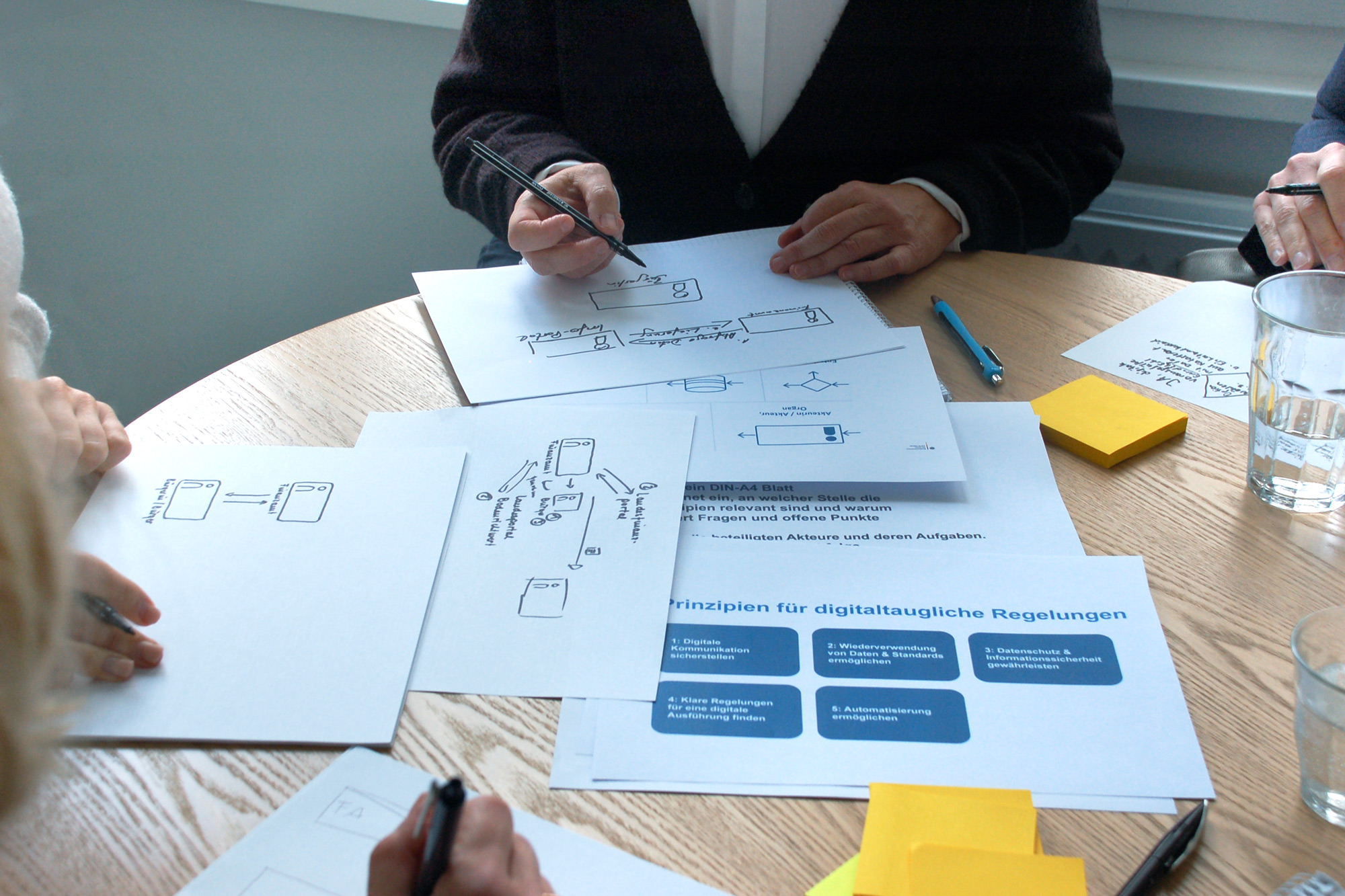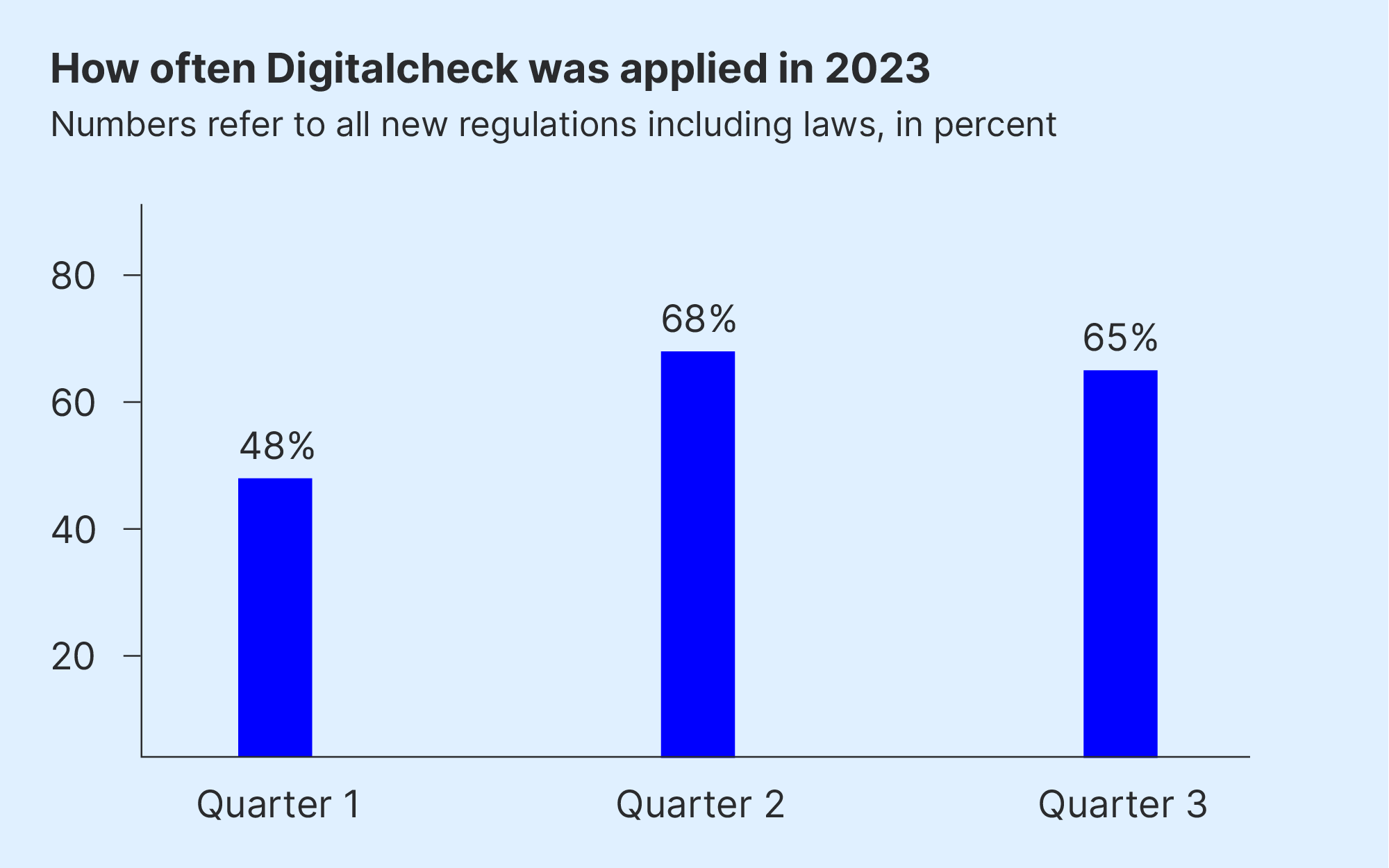
One year in: Digitalcheck has become established
Policy drafting personnel in German federal ministries began applying Digitalcheck for new legislation in January 2023. Now, almost a year on, the impact of Digitalcheck is growing ever more apparent. It has become integrated into real-world practice and has kickstarted the transformation toward digital-ready legislation.
This has laid the foundations for improving the digital implementation of regulations across the board – with all the advantages in terms of efficiency, user-friendliness, and cutting bureaucratic red tape that brings for constituents, companies, and the government agencies tasked with implementing regulations. We’d like to share a few particularly positive highlights from 2023 in this post.
Ernst Bürger, Department Head “Digital Administration” at the Federal Ministry of the Interior and Community, in an interview with eGovernment (German only)
Things are looking positive at this point, with Digitalcheck having been in place for almost a year. At the same time, we know we’re just at the start of a paradigm shift that will take some time. (…) Zooming out to the bigger picture, it is clear that Digitalcheck is an important building block of the digital transformation in our country.
Ministry usage of Digitalcheck on the rise
The percentage of new regulations for which policy drafters applied Digitalcheck has risen steadily over the year. As of mid-November, the average annual application rate for new laws has climbed to a whopping 83%: 72 of the 87 laws handled at the German federal cabinet level took digital feasibility into account.

The impact of the five principles for digital-ready legislation is also increasingly showing up in individual regulations: For example, written form requirements have been removed from the Family Start Time Act. The Child Allowance Data Retrieval Ordinance (German only), for its part, makes it possible to reuse data that is already available from child benefit applications, so parents do not have to find and enter the information all over again when applying for the child allowance as well. The automation options added to the Secondary Credit Markets Act (German only) and the definition of legal terms in the changes to Germany’s law on married names and birth surnames (in German) are further examples of digital-ready policymaking.
Policy drafter at the Digitalcheck Workshop on October 17, 2023
The deeper you dive, the more you see just how important and versatile these principles are.
Examples of digital-ready legislation like these are especially encouraging because factoring digital implementation into the legislative process right from the start marks a fundamental cultural shift for many policy drafters, and these examples show that this shift is occurring. While the main focus is often on drafting regulatory texts that are correct in both subject-specific and legal terms, considering digital readiness alongside other factors systematically incorporates questions of implementation into the regulatory process. This also broadens the range of methods used in drafting new laws. We are delighted to have embarked on this journey to craft suitable solutions to meet these new requirements in partnership with policy drafters.

We offer policy drafters many different forms of support for applying Digitalcheck.
Our support options are well received
It is nice to see that many kinds of support offered for Digitalcheck were very well received in 2023, over and above the broad informational campaign marking the launch, which reached more than 500 participants across all (!) departments. The support formats we have devised and continue to refine and develop are being actively used, and meet the needs of the policy drafting personnel.

Over 60 support requests handled, from minor administrative questions to joint workshops with the government agencies responsible for implementation

Support for two selected legislative drafting processes provided by interdisciplinary task force comprising experts in software development, design, and product management

Digitalcheck incorporated into existing training activities on the legislative process at German Federal Academy of Public Administration (BAköV)

Additional 9 workshops with 161 policy drafters

Regular open and easily accessible online office hours

Improved information options in federal ministries
The feedback received from participants and the long waitlist for the next sessions indicate that the workshops are especially helpful. In this format, we walk through Digitalcheck as a group, based on a concrete example drawn from real-world practice. We also apply methods of crafting digital-ready legislation, such as visualization.
Policy drafter at Digitalcheck workshop on July 25, 2023
Digitalcheck is a bit of a hassle right now, of course, because it means added work. But all of us do need to automatically think about regulations this way.
Increasing use of new methods
Another highlight is that the use of visualizations is also on the rise. In the third quarter of 2023, some 30% of all proposed regulations with a digital aspect already involved a visualization. This is a good tool for thinking through complex processes with an eye to real-world impacts while also conveying this information to other stakeholders in an easily grasped format. This means visualization offers especially great potential for ensuring the digital readiness of regulations. The National Regulatory Control Council (NKR) report on the draft legislation amending Germany’s law on married names and birth surnames (NKR No. 6652 – German only) even includes the process visualization that was submitted.
From the NKR Annual Report 2023 Page 41 (full report in German)
Visualizing the implementation process is especially helpful in ensuring that a proposed piece of legislation is digital-ready, and thus also ready for real-world use, right while it is being drafted.
From the NKR Annual Report 2023 Page 39 (full report in German)
The NKR is encouraged to see that process visualizations were submitted for nearly 30% of all proposed regulations with digital aspects in the third quarter, up from ten to 15% in the first two quarters of the year.
Positive response to user-centered development
Developments in 2023 also showed that the methodology used for cooperation is having the desired impact. One of the crucial factors in Digitalcheck’s success is its ongoing development in line with users’ needs. This is carried out under the auspices of the Federal Ministry of the Interior and Community (BMI), with support from an inter-ministerial working group that includes the NKR. Data from concrete use plays a key role in this, as it keeps us from developing the tool in directions that diverge from actual needs. We have released three more versions of Digitalcheck since it was first launched. Refinements have included introducing context fields for explanations and improving the methodological guidance provided for visualization.
The key points of the Digitalcheck program (in German) adopted by the German federal cabinet in August not only underscore that the tool is mandatory, but also establish this iterative, user-centered approach at the policy level – a milestone for political initiatives.
Stephanie Kaiser, CPO at DigitalService, in an interview with eGovernment (German only)
Now, after almost a year, we can clearly see the added value of an iterative, user-centered approach. This really is a new approach in this context.
The advantages of this approach are also gaining broader recognition, as several states are planning to model their own “Digitalchecks” on the approach being taken at the federal level. We are already in direct talks about this with four states.
Embedded in the ecosystem of improved digital legislation
Another factor we felt was crucial in ensuring the lasting success of a digital-ready legislative process was making sure to consider the full range of relevant initiatives and stakeholders across the entire ecosystem right from the start, thereby actively shaping interfaces and strategically tapping into synergies. To that end, we are a part of the GovLabDE legislative digitalization project (page in German only), which is headed jointly by the German Chancellery, Federal Ministry of Justice, and Federal Ministry of the Interior and Community. We have also been in direct dialogue this year with all of the relevant initiatives and stakeholders within the German federal government, including:
- Key projects aimed at improving the legislative process, such as the Zentrum für Legistik and Praxis-Check (both pages in German only)
- Measures aimed at digital policymaking, such as the German federal government’s E-Gesetzgebung initiative (page in German only) and the New Legal Information System (NeuRIS) project
- Key elements of the digital transformation of the administration, such as Federal Information Management (German only)
We plan to continue this systematic networking in the coming year as well, in order to work toward shared objectives.

We have showcased Digitalcheck at a range of events, seeking dialogue with audiences – like here, at re:publica 2023.
There is also great international interest in dialogue on the German approach to digital-ready legislation. This has prompted us to present our approach and experiences in bilateral formats with individual countries, such as Denmark and the UK, and just recently in the EU context as well. We have seen especially positive feedback for the holistic approach, the gradual introduction of visualization, and the use of an interdisciplinary task force to support individual legislative projects.
The German approach to digital-ready policymaking is effective or highly effective.
Ninety-three percent of attendees at a webinar on digital-ready legislation at the EU level that presented Digitalcheck agreed with this statement. A recording of the event is available here.
Our goals for 2024
The successful launch of Digitalcheck shows that digital-ready legislation is a fundamental element of a digital state.
Activities in the coming year will focus on scaling up the impact of Digitalcheck step by step – both qualitatively, by further increasing the effectiveness of our tools and the support options we offer, and quantitatively, by broadening the application of Digitalcheck.
To that end, we will be further pursuing the previously identified topics of focus:
- We plan to support specific regulatory projects with specialists from the fields of software development, design, and product management. This will allow us to provide direct support in shaping digital-ready policies while also gleaning insights regarding solutions suitable for real-world practice.
- We will continue to improve the support we provide to policy drafters in creating visualizations with simple digital tools. We are already working on initial technical prototypes.
Following the rapid launch of the beta version in early 2023 and the positive empirical experience we gained in the course of the year, we are now even more motivated: Digital-ready legislation is an important tool for the digital transformation, and we are on the right track. Our methods, offerings, and tools for this have been adopted at the various ministries. In the coming year, we plan to further expand and optimize them so that the potential of digital-ready policymaking can be tapped even more for a proactive, digital state.
For further information on Digitalcheck, its contents and how it came about, please see our previous blog posts.



